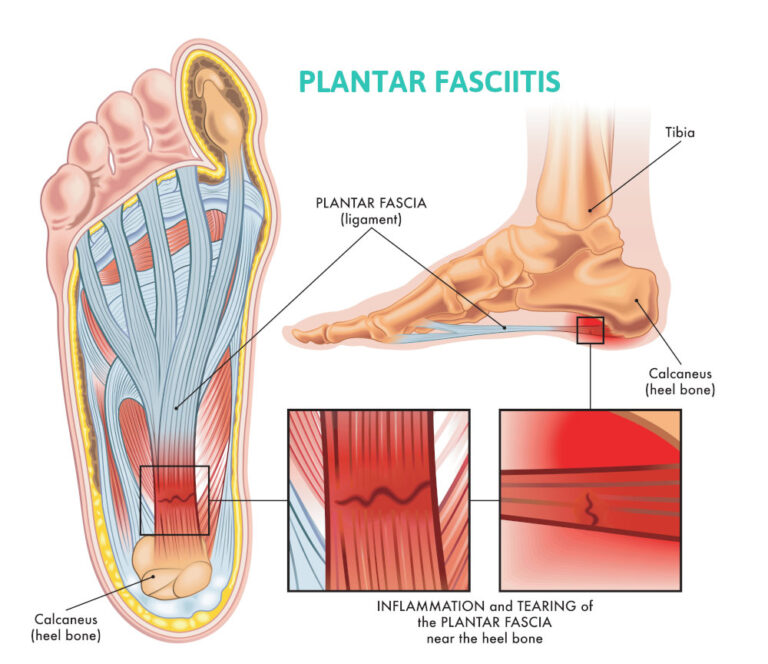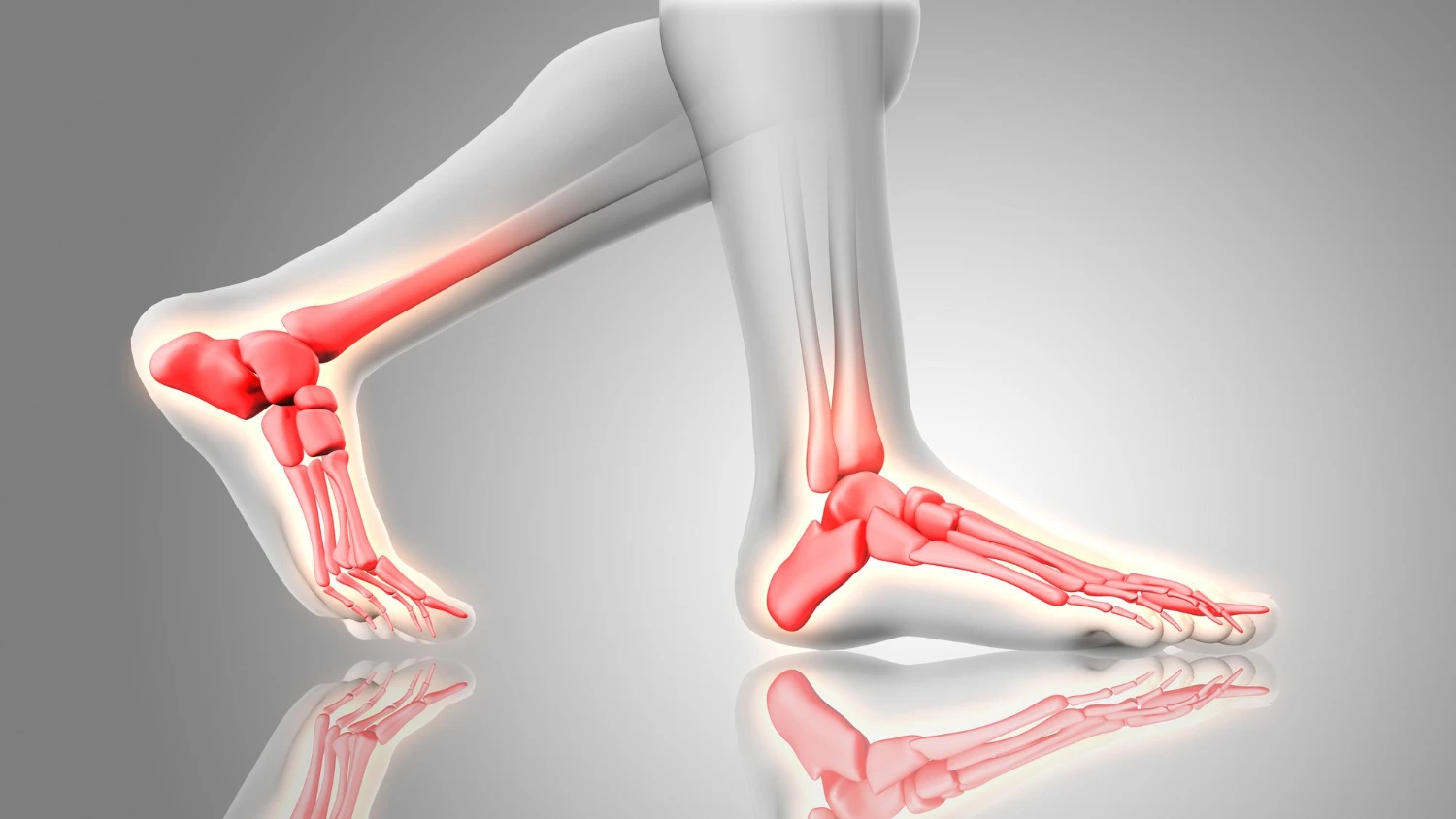
Plantar Fasciitis
Understanding Plantar Fasciitis
Book Your Visit Now
Plantar fasciitis is one of the most common causes of heel pain, affecting the thick band of tissue (the plantar fascia) that connects your heel bone to your toes. When this tissue becomes inflamed, it can cause sharp, stabbing pain—especially with your first steps in the morning or after long periods of rest. While the discomfort can be frustrating, effective foot care and early treatment from a skilled podiatrist can make a significant difference. With timely intervention, most patients can return to pain-free movement and enjoy daily activities again.
Book Your Visit Now
Spot the Symptoms Before It Gets Worse
Plantar fasciitis often begins with a sharp, stabbing pain in the heel or along the arch of the foot. This discomfort is typically most intense during the first steps in the morning but can also flare up after long periods of sitting or standing. While the pain may ease with movement, it often returns after extended activity or when getting back on your feet after rest. Recognizing these symptoms early can help prevent the condition from worsening and support faster healing.

Key Causes & Contributing Factors
Plantar fasciitis can develop from a variety of causes. Common factors that increase your risk include:
• Overuse: Repetitive stress from activities like long-distance running, ballet, or aerobic dance can strain the heel and surrounding tissues.
• Foot Structure: Conditions such as flat feet, high arches, or abnormal walking patterns can unevenly distribute weight, placing extra pressure on the plantar fascia.
• Age: This condition most often affects people between 40 and 60 years old.
• Obesity: Carrying excess weight increases the strain on your plantar fascia.
• Occupation: Jobs that involve prolonged standing or walking on hard surfaces can heighten your risk.
Understanding these factors can help you take proactive steps toward relief and prevention. If you’re experiencing symptoms, don’t hesitate to seek expert care.

Expert Plantar Fasciitis Diagnosis
At the heart of quality foot care is an accurate diagnosis. Our experienced podiatrist begins by conducting a thorough physical examination and reviewing your medical history in detail. We evaluate the tenderness, intensity, and precise location of your foot pain to fully understand your condition. While imaging tests like X-rays or MRIs are rarely needed, they may be used to rule out other potential issues—such as fractures or nerve compression—ensuring you receive the most precise diagnosis and the right treatment path.

Comprehensive Treatment Options
Our goal is to relieve your pain and reduce inflammation while helping you regain mobility. Most patients find significant relief through conservative treatments tailored to their needs, including:
• Rest: Limiting activities that worsen pain to give your foot time to heal.
• Ice Therapy: Applying ice for 15-20 minutes several times a day to reduce swelling and soothe discomfort.
• Stretching Exercises: Targeted stretches for the plantar fascia and Achilles tendon to improve flexibility and reduce tension.
• Supportive Footwear: Choose shoes with proper arch support and cushioning to ease pressure on your feet.
• Custom Orthotics: Personalized inserts that help evenly distribute pressure and improve foot alignment.
• Physical Therapy: Guided exercises to strengthen lower leg muscles, improve walking stability, and decrease strain on the plantar fascia.
If you’re struggling with plantar fasciitis, these treatments can be highly effective in helping you get back on your feet comfortably.

Break Free from Plantar Fasciitis with Advanced Care
When conservative methods aren’t enough, advanced treatments can offer lasting relief and healing. At Anderson Podiatry Center, we provide effective, minimally invasive options tailored to your condition and lifestyle:
• Orthodics
• Regenerative Medicine:Harnesses your body’s own healing power to repair damaged tissue and promote long-term recovery.
• MLS Laser Pain Therapy:An FDA-approved treatment that uses laser energy to reduce pain and inflammation—often within just a few sessions.
• Extracorporeal Shock Wave Therapy (ESWT): A non-invasive treatment using sound waves to stimulate natural healing in the plantar fascia.
• Corticosteroid Injections: Reduce inflammation and provide temporary relief from intense pain.
• Surgery: Reserved for severe cases, surgery may be considered when all other treatments have failed to ease the pain.

Prevent Plantar Fasciitis Before It Starts
Protecting your feet now can help you avoid pain later. Prevention is all about reducing stress on the plantar fascia and maintaining overall foot health. Here’s how:
• Maintain a Healthy Weight: Less weight means less pressure on your feet.
• Wear Supportive Footwear: Choose shoes with proper arch support and cushioning. Avoid high heels and worn-out shoes.
• Stretch Daily: Gentle stretches for your feet and calves can keep tissues flexible and resilient.
• Ease Into New Activities: Start slow and build up your activity level over time. Avoid doing too much too soon to prevent straining the plantar fascia.

When to Seek Professional Care
When heel pain doesn’t improve with home remedies or starts to limit your daily activities, seeking expert foot care is essential. Early evaluation allows your podiatrist to accurately diagnose the issue and tailor a treatment plan that fits both the severity of your condition and your individual lifestyle, preventing long-term complications and restoring your comfort.

Take Charge of Your Foot Health Today
Plantar fasciitis is a common condition that, with the right care, can be effectively managed. By recognizing the symptoms early and understanding your treatment options, you can reduce pain and lower the risk of recurrence. From simple home remedies to advanced medical therapies, numerous effective solutions are available to help you return to your daily activities comfortably and confidently. If heel pain is affecting your life, don’t wait—consult with a trusted foot specialist who can create a personalized treatment plan tailored to your unique needs.
Schedule a consultation with us today and take the first step toward lasting relief.
• Most insurance plans accepted
• Medicare-certified, state-of-the-art surgery center

